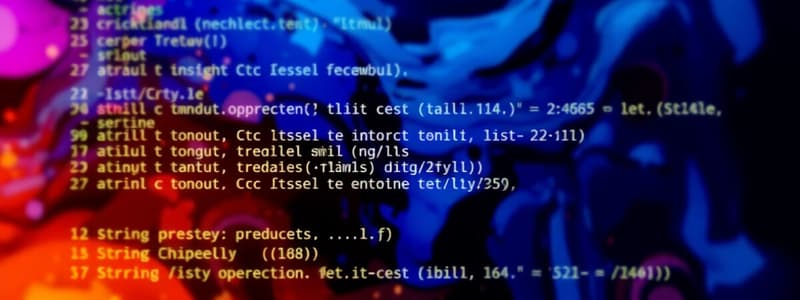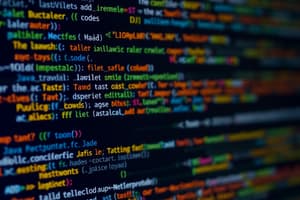Podcast
Questions and Answers
What is the output of the code snippet: name = input('Enter your name: ') followed by print('Hello, ' + name + '!') if the user inputs 'Alice'?
What is the output of the code snippet: name = input('Enter your name: ') followed by print('Hello, ' + name + '!') if the user inputs 'Alice'?
- Hello, Alice! (correct)
- Enter your name: Alice!
- Alice!
- Hello, !
How can you correctly convert a string input, '42', into an integer in Python?
How can you correctly convert a string input, '42', into an integer in Python?
- num = '42'.int()
- num = convert('42', int)
- num = int('42') (correct)
- num = input('42')
What will happen if you try to convert the string 'Hello' to an integer using int('Hello')?
What will happen if you try to convert the string 'Hello' to an integer using int('Hello')?
- It will throw a type error.
- It will return 'Hello'.
- It will return 0.
- It will throw a value error. (correct)
Which of the following statements best describes how argument passing works in Python functions?
Which of the following statements best describes how argument passing works in Python functions?
What is a significant limitation of the input function in Python regarding the data type it returns?
What is a significant limitation of the input function in Python regarding the data type it returns?
What is the primary purpose of the str() function in Python?
What is the primary purpose of the str() function in Python?
What will be the output of the following code snippet?
string1 = "Hello"
string2 = "World"
result = string1 + " " + string2
print(result)
What will be the output of the following code snippet? string1 = "Hello" string2 = "World" result = string1 + " " + string2 print(result)
How does the input function behave when it receives numeric input?
How does the input function behave when it receives numeric input?
What is an argument in the context of a function call?
What is an argument in the context of a function call?
In the statement def function_name(parameter):, what is 'parameter' referred to as?
In the statement def function_name(parameter):, what is 'parameter' referred to as?
What is the typical three-step process a computer performs when executing a function?
What is the typical three-step process a computer performs when executing a function?
Which option describes the scope of a parameter in a function?
Which option describes the scope of a parameter in a function?
When concatenating a non-string type with a string, how can you properly handle this in Python?
When concatenating a non-string type with a string, how can you properly handle this in Python?
What is the minimum participation rate required to earn 5 bonus marks?
What is the minimum participation rate required to earn 5 bonus marks?
What should a student do if they need to attend a make-up session?
What should a student do if they need to attend a make-up session?
Which of the following statements is true regarding tutorial participation?
Which of the following statements is true regarding tutorial participation?
What does the content suggest students should do to engage in Python coding exercises?
What does the content suggest students should do to engage in Python coding exercises?
Upon starting the tutorial attendance tracking, which weeks are excluded from participation calculations?
Upon starting the tutorial attendance tracking, which weeks are excluded from participation calculations?
What will be the output of the code snippet where 'alice' is 50 and 'peter' is 70?
What will be the output of the code snippet where 'alice' is 50 and 'peter' is 70?
What is the role of curly braces in an f-string in Python?
What is the role of curly braces in an f-string in Python?
Which of the following lines of code contains a syntax error?
Which of the following lines of code contains a syntax error?
Which of the following statements correctly initializes the variable 'name'?
Which of the following statements correctly initializes the variable 'name'?
What does the 'end' parameter in the print function do when set to '#'?
What does the 'end' parameter in the print function do when set to '#'?
What will the variable 'total' store after executing the code snippet with 'scores = [1,2,3,4]'?
What will the variable 'total' store after executing the code snippet with 'scores = [1,2,3,4]'?
What is interpreted by Python when using 'f' before a string?
What is interpreted by Python when using 'f' before a string?
When defining data types for variables in the Battleship game, which is NOT a required variable?
When defining data types for variables in the Battleship game, which is NOT a required variable?
What will be the output of the following code: print('Hello', 'World', sep='-', end='!')? print(' How are you?')
What will be the output of the following code: print('Hello', 'World', sep='-', end='!')? print(' How are you?')
What argument would you use in the print function to change the default space between items?
What argument would you use in the print function to change the default space between items?
How would you correctly format a string using concatenation to include variables 'name', 'age', and 'country'?
How would you correctly format a string using concatenation to include variables 'name', 'age', and 'country'?
What is the main purpose of the 'end' parameter in the print function?
What is the main purpose of the 'end' parameter in the print function?
What will be the output of this string: print('Hello, my name is', name, '.', 'I am', age, 'years old and I live in', country, '.')?
What will be the output of this string: print('Hello, my name is', name, '.', 'I am', age, 'years old and I live in', country, '.')?
Which feature of f-strings makes them easier to use compared to traditional string formatting methods?
Which feature of f-strings makes them easier to use compared to traditional string formatting methods?
Which of the following correctly demonstrates the use of the print function with an f-string?
Which of the following correctly demonstrates the use of the print function with an f-string?
Study Notes
Basic String Operations
- Concatenation combines two strings using the
+operator, e.g.,result = string1 + " " + string2produces "Hello World". - The
str()function converts non-string types to strings, useful for concatenation, e.g.,message = "I am " + str(age) + " years old.".
Input, Processing, and Output
- Programs follow a three-step process: receive input, process it, and produce output.
- Input can be any data during program execution, e.g.,
name = input("Enter your name: ").
Functions and Parameters
- Arguments are pieces of data sent to functions, allowing for customized processing.
- A parameter is a variable assigned the value of an argument when the function is called, defining the function's scope.
Reading Input
- The
input()function reads data as a string, even numeric inputs, e.g.,variable = input(prompt). - Numeric conversions require built-in functions like
int(item)andfloat(item)to ensure the item is valid.
Passing Multiple Arguments
- Functions can accept multiple arguments specified in a parameter list, separated by commas.
- Arguments can be passed by position, matching the order of parameters.
Printing Output
- The
print()function displays output, executing statements in the order they appear. - Multiple items in
print()are separated by spaces by default but can be customized using thesepargument.
Customizing Print Behavior
- Use the
endargument inprint()to change the default newline character to a specified delimiter, e.g.,print("Hello", end="#").
F-Strings
- Introduced in Python 3.6, f-strings allow inline variable interpolation for flexibility, e.g.,
greeting = f'Hello, {name}!'. - They support any valid Python expression within curly braces for dynamic string generation.
Error Handling
- A syntax error in code often requires correction in the indicated line to ensure proper execution.
Engagement and Participation
- Active tutorial participation can yield bonus marks, rewarding students with consistent attendance.
- Make-up sessions require email approval with valid reasons and are subject to attendance tracking.
Basic Coding Exercises
- Exercises include writing pseudo code for game logic and flowcharts for processes.
- Basic coding involves defining data types and user input operations related to game dynamics.
Studying That Suits You
Use AI to generate personalized quizzes and flashcards to suit your learning preferences.
Description
This quiz covers basic string operations including concatenation and how to read and process input in programming. You'll explore the use of functions, parameters, and data type conversions. Test your understanding of these fundamental concepts essential for program execution.




